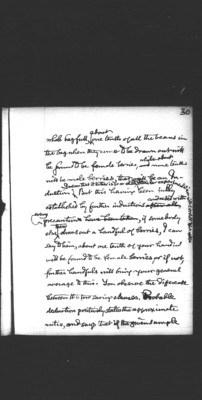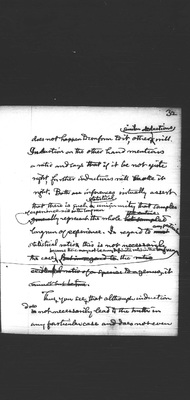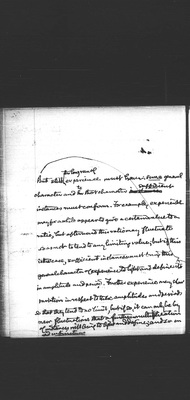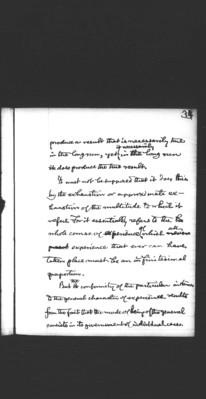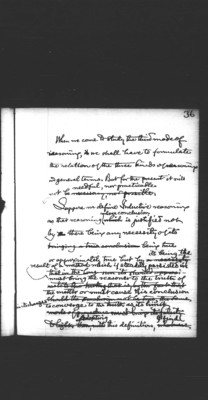Pages
16
30
whole bagfull, about one tenth of all the beans in the bag when they come to be drawn out will be found to be female berries, while about nine tenths will be male berries, that will be an Induction. I mean that it either is so or else [??] similar experimentation will correct this ratio. But this having been fully established by further inductions conducted with every precaution, if somebody else draws out a handful of berries, I can say to him, about one tenth of your handful will be found to be female berries, or if not, further handfuls will bring your general average to this. You observe the difference between the two saving clauses. Probable deduction positively states the approximate ratio, and says that if the given sample
17
32
does not conform to it, other similar deductions will. Induction on the other hand mentions a ratio and says that if it be not quite right, further inductions will make it right. Both inferences virtually assert that there is such a statistical uniformity that samples of experience will in the long run represent the whole long run of experience. In regard to any particular statistical ratio this is not necessarily the case, because there may not be any definite ratio in the long run.
Thus you see that although induction does not necessarily lead to the truth in any particular case and does not even
18
But still the long run of experience must have some general character and to that character sufficient instances must conform. For example, experience may for awhile appear to give a certain value to a ratio, but afterward this ratio may fluctuate so as not to tend to any limiting value; but if this is the case, sufficient instances will bring this general character of experience to light and define it in amplitude and period. Further experience may show variation in respect to the amplitudes and periods so that they tend to no limit, but if so, it can only be by new fluctuations that a further multiplication of instances will bring to light and define; and so on ad infinitum.
19
34
produce a result that is necessarily true in the long run, yet it necessarily in the long run does produce the true result.
It must not be supposed that it does this by the exhaustion or approximate exhaustion of the multitude to which it refers. For it essentially refers to the whole course of experience of which all experience that ever can have taken place must be an infinitesimal proportion.
But the conformity of the particular instance to the general character of experience results from the fact that the mode of being of the general consists in its government of individual cases.
20
36
When we come to study the third mode of reasoning we shall have to formulate the relation of the three kinds of reasoning in general terms. But for the present it will not be needful, nor practicable.
Suppose we define Inductive reasoning as that reasoning whose conclusion is justified not by there being any necessity of its being true or approximately true but by its being the result of a method which if steadily persisted in must bring the reasoner to the truth of the matter or must cause his conclusion in its changes to converge to the truth as its limit. Adopting this definition, I find
